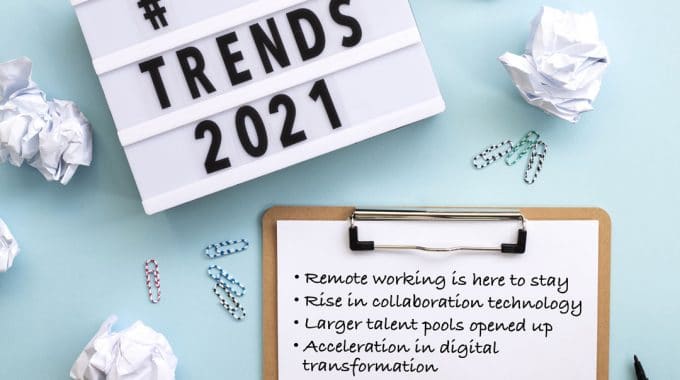The pandemic sparked a global work-from-home experiment practically overnight but when lockdown was initially announced,…

Workplace predictions for 2021
2020 was a year of uncertainties but one thing’s for sure, none of us could have predicted the upheaval to the world of work. The shift to remote working, getting to grips with new technologies, an increased focus on mental health and the distraction of home-schooling or having loved ones to care for – the pandemic has rewritten the rules of work.
As we reach the one-year anniversary of Lockdown 1.0, there has been a noticeable shift in attitude. The novelty has gone, there’s less sympathy around operational teething pains and it’s very much a case of ‘time to get on with it.’ So, what can we expect for the workplace in 2021?
Remote work is here to stay, but the office still has its place
While 2020 proved we could work from anywhere, it also reminded us of how much we value genuine face-to-face interaction and the routine of getting up and out to work. Hybrid working is the future – it offers the flexibility that comes with home working and means and when people do make the effort to collaborate and innovate, it’ll be even more special. This year, organisations will be thinking creatively to ensure their offices are designed to meet the new requirements of their teams.
It’s quality over quantity when it comes to communication
Since the pandemic, teams have become more comfortable with communication at several times throughout the day rather than waiting until they meet together. Employees are using collaboration technology like Teams, Slack and even WhatsApp to keep in regular contact which not only ensures they feel connected to their colleagues but that when group meetings do happen, they can focus on what’s important.
The talent pool is wider
From a hiring point of view, the rise of remote working means businesses can access talent without the limitation of location. Recruiters and in-house hiring managers can cast a wider net and source employees from a larger talent pool. This also supports diversity and inclusion efforts – companies can consider people from different backgrounds, perspectives, and experiences.
When operating with long distance teams, investment in learning and development, mentorship and technology is vital to ensure that employees can perform to their full potential – and do so happily.
Digital transformation will be accelerated
Adopting technology is no longer an option but the reality is that each organisation will do so in their own time. They may be locked into existing contracts with suppliers, have limited budgets or need to upgrade hardware. However small the steps though, the journey to digital transformation must be accelerated in 2021.
Committing to this will improve customer experience and engage a distributed workforce – benefitting businesses now and future-proofing them too.


